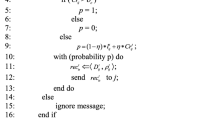Abstract
When each peer provides data transmission, storage and other related services for other in Peer-to-peer networks, the basic requirement is to ensure that the system has good robustness and availability. Specific to the different practical needs, it’s also to ensure that the system has scalable. In the Mirror Incentive Policy, the system would lose robustness at the low proportion of reciprocators. In this paper, we propose a new incentive policy called Wise Incentive Policy. In the Wise Incentive Policy, the system can achieve the robustness, even if the proportion of defectors is high at the beginning. Simulation experiments verify the validity of the proposed method in peer-to-peer networks.










Similar content being viewed by others
References
Awiphan, S., Su, Z., & Katto, J. (2013). Service differentiation based incentive mechanism for p2p streaming in hybrid overlay network. ITE Transactions on Media Technology & Applications, 1(2), 167–177.
Zhao, B. Q., Lui, J. C. S., & Chiu, D. M. (2012). A mathematical framework for analyzing adaptive incentive protocols in p2p networks. IEEE/ACM Transactions on Networking, 20(2), 367–380.
Karakaya, M., Korpeoglu, I., & Uluso, Özgür. (2008). Free riding in peer-to-peer networks. Computer Networks, 52(3), 675–694.
Golle, P., Leytonbrown, K., & Mironov, I. (2001). Incentives for sharing in peer-to-peer networks. Lecture Notes in Computer Science, 6(2), 264–267.
Silva, B. M. C., Rodrigues, J. J. P. C., Kumar, N., & Han, G. (2015). Cooperative strategies for challenged networks and applications: a survey. IEEE Systems Journal, 99, 1–12.
Cui, G., Li, M., Wang, Z., Ren, J., Jiao, D., & Ma, J. (2015). Analysis and evaluation of incentive mechanisms in p2p networks: a spatial evolutionary game theory perspective. Concurrency & Computation Practice & Experience, 27(12), 3044–3064.
Aslani, R., Hakami, V., & Dehghan, M. (2017). A token-based incentive mechanism for video streaming applications in peer-to-peer networks. Multimedia Tools & Applications, 5, 1–29.
Awiphan, S., Su, Z., & Katto, J. (2013). Service differentiation based incentive mechanism for p2p streaming in hybrid overlay network. ITE Transactions on Media Technology & Applications, 1(2), 167–177.
Guo, D., Kwok, Y. K., Jin, X., & Deng, J. (2016). A performance study of incentive schemes in peer-to-peer file-sharing systems. Journal of Supercomputing, 72(3), 1152–1178.
Xiang, Z., & Iamnitchi, A. (2016). A survey of socially aware peer-to-peer systems. ACM Computing Surveys, 49(1), 1–28.
Kurdi, H. A. (2015). Honestpeer: an enhanced eigentrust algorithm for reputation management in p2p systems. Journal of King Saud University—Computer and Information Sciences, 27(3), 315–322.
Gupta, R., & Singh, Y. N. (2013). Trust estimation in peer-to-peer network using blue. Computer Science, 21(1), 103–105.
Rui, L., Pan, Z., Huang, H., & Qiu, X. (2016). Reputation-based incentive mechanisms in crowdsourcing. Journal of Electronics & Information Technology, 07, 1808–1815.
Palomar, E., Alcaide, A., Ribagorda, A., & Zhang, Y. (2012). The peer’s dilemma: a general framework to examine cooperation in pure peer-to-peer systems. Computer Networks, 56(17), 3756–3766.
Zhang, Chuang, Zhao, Honglin, & Jia, Min. (2015). Game Theoretic Analysis for Pricing-based Incentive Mechanism in Non-dedicated Cooperative Relay Networks. Journal of Central South University of Technology, 22(10), 3977–3989.
Kuchesfehani, E. K., & Zaccour, G. (2016). Incentive equilibrium strategies in dynamic games played over event trees. Automatica, 71, 50–56.
ChunMei, G. U. I., Qiang, J. I. A. N., HuaiMin, W. A. N. G., & QuanYuan, W. U. (2010). Repeated game theory based penalty-incentive mechanism in internet-based virtual computing environment. Journal of Software, 21(12), 3042–3055.
Lu, K., Wang, S., Xie, L., Wang, Z., & Li, M. (2016). A dynamic reward-based incentive mechanism: reducing the cost of p2p systems. Knowledge-Based Systems, 112, 105–113.
Nowak, M. A., & Sigmund, K. (1998). Evolution of indirect reciprocity by image scoring. Nature, 393(6685), 573–577.
Acknowledgements
This work is supported in part by the National Natural Science Foundation of China under Grant No. 6137006, National Social Science Foundation Under Grant No. 16BGL181 and Shandong Spark Program under Grant No. 2013XH17004.
Author information
Authors and Affiliations
Corresponding author
Rights and permissions
About this article
Cite this article
Zhang, Q., Zhu, L. & Yang, X. A New Incentive Policy for Improving Data Service in P2P Networks. Wireless Pers Commun 103, 231–245 (2018). https://doi.org/10.1007/s11277-018-5438-6
Published:
Issue Date:
DOI: https://doi.org/10.1007/s11277-018-5438-6




